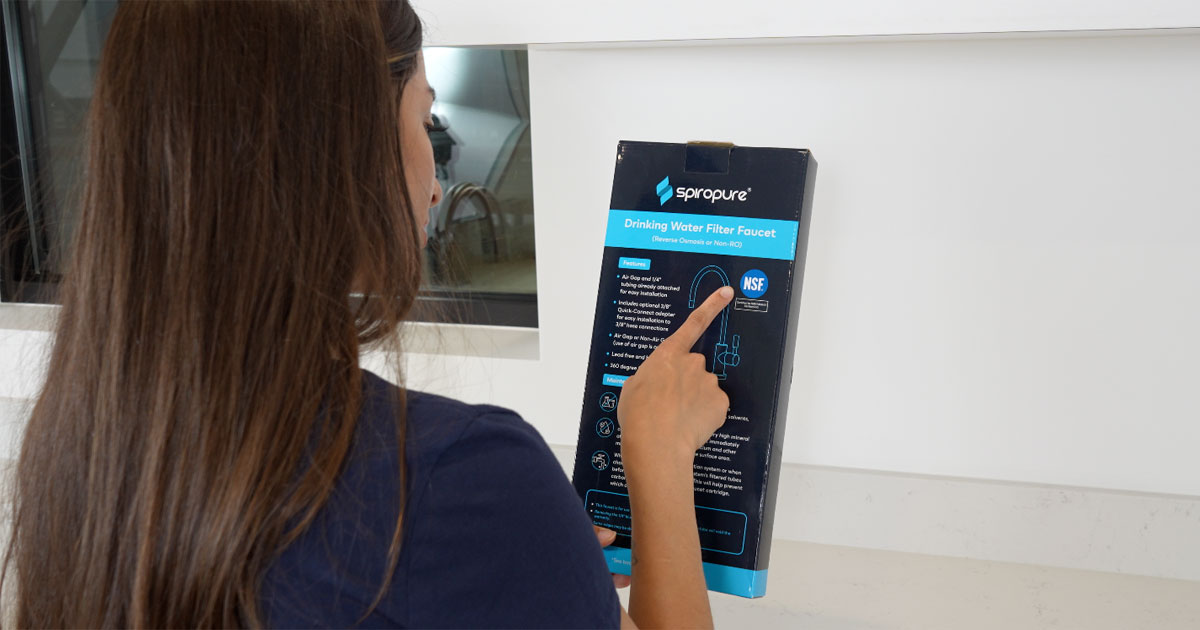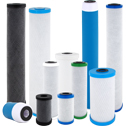NSF, WQA, IAPMO Certifications in Filtration and When They Matter
 Andrew
November 26, 2025
#certification
#filtertypes
#iapmo
#nsf
#wqa
Andrew
November 26, 2025
#certification
#filtertypes
#iapmo
#nsf
#wqa

- Water filter certifications can cost manufacturers $100,000-$200,000, with expenses passed to consumers, but many effective filtration technologies don't require costly validation to deliver excellent performance
- NSF, WQA, and IAPMO all test to identical ANSI/NSF standards, meaning certification quality remains consistent regardless of which organization conducts the testing.
- Certifications matter most for serious health contaminants, lead concerns, or regulatory requirements, while basic applications like sediment and carbon filtration often perform well without expensive certification.
- Smart filtration decisions balance specific contamination needs against certification costs—municipal water may only need basic improvement while well water benefits more from certified health-effects filtration.
How Water Filter Certification Actually Works
Third-party certification involves comprehensive testing protocols that examine both safety and performance claims. Organizations like NSF, WQA, and IAPMO operate independent laboratories where they subject filters to standardized contaminant challenges, measuring reduction rates, flow performance, and structural integrity over extended periods.
The process begins with extensive documentation review, followed by factory inspections and material analysis. Filters undergo continuous testing with specific contaminant concentrations while maintaining required flow rates. Products must consistently meet reduction percentages for each claimed contaminant throughout their rated lifespan—not just at initial installation.
What certification testing validates:
- Contaminant reduction claims under standardized conditions
- Structural integrity and component safety over filter life
- Flow rate maintenance throughout rated capacity
- Materials compliance for drinking water contact in filters and fixtures such as faucets
- Manufacturing quality control and consistency
How reliable is NSF certification and how does it compare to alternative certifications? All three major organizations—NSF, WQA, and IAPMO—test to identical ANSI/NSF standards, meaning IAPMO certified products, for example, undergo the same rigorous protocols as those certified directly by NSF International. The testing standards remain consistent regardless of which organization conducts the certification.
IAPMO vs NSF: Understanding Certification OptionsWhen comparing IAPMO certified vs NSF certified products, you're essentially comparing different certification bodies that test to identical standards. IAPMO (International Association of Plumbing and Mechanical Officials) was founded in 1926, while the Water Quality Association has operated since 1974. All three organizations maintain accredited laboratories and follow the same ANSI/NSF testing protocols.
The choice between certification bodies can come down to manufacturer preference, geographic considerations, or specific expertise areas. Some manufacturers prefer working with WQA for their industry connections, while others choose IAPMO for their broader plumbing and mechanical systems expertise.
Key Certification Bodies and Their Focus:
- NSF International: Originally the National Sanitation Foundation, NSF International is the original developer of most water treatment standards with the highest consumer recognition
- Water Quality Association (WQA): Industry-focused certification with strong manufacturer relationships
- IAPMO R&T: IAPMO R&T is the research and testing arm of IAPMO that handles product certification and includes comprehensive plumbing and mechanical systems expertise with efficient processes.

When Water Filter Certifications Matter Most
Certain filtration applications genuinely benefit from third-party certification, particularly when dealing with serious health contaminants or complex filtration challenges. For households with lead concerns, well water contamination, or immune-compromised family members, certified filters provide independent verification that reduction claims are accurate and sustainable.
Refrigerator filters may carry NSF 42, 53, and 372 certifications because refrigerator manufacturers typically certify their filters to ensure consistent performance and meet warranty requirements. Similarly, commercial and industrial applications often require certified products to meet regulatory or insurance requirements.
Many compatible alternatives focus on NSF 42 and 372 standards, using the same proven filtration media as OEM filters but skipping additional certifications to pass along cost savings to consumers while maintaining full confidence in the media's performance.
Certification also provides valuable consumer protection in categories where performance claims are difficult to verify independently. Reverse osmosis systems, for example, may benefit from NSF 58 certification because their multi-stage processes and membrane technologies require sophisticated testing to validate comprehensive contaminant removal.
On the other hand, many filtration systems deliver excellent performance without expensive certification processes by using the same filtration media and advanced RO membranes. The same is true of individual filters. Sediment filters, for instance, use mechanical filtration principles that are easily understood and verified—micron ratings and dirt-holding capacity don't require costly testing programs to validate.
Basic carbon filtration technology is well-established and proven, particularly for chlorine and taste/odor improvement. When manufacturers use quality activated carbon media and proven filter designs, the filtration effectiveness is largely determined by carbon quality and contact time rather than certification status. For most consumers, basic certification to NSF/ANSI Standard 42 for material safety and chlorine reduction provides adequate verification without the expense of comprehensive health-effects testing.
Here are several applications where uncertified options typically excel:
- Sediment and particulate filtration with clear nominal micron ratings
- Pre-filtration stages in multi-stage systems
- Systems where cost savings are prioritized over third-party validation
- Municipal water that already meets safety standards but needs aesthetic improvement
After market filtration brands master this approach by focusing resources on quality filtration media and proven designs rather than expensive certification processes. For many applications this allows significant cost savings while maintaining effective filtration performance. But consumers should evaluate their specific needs. Certified options provide independent verification that may be important for health-related contaminant concerns or regulatory requirements in specialized applications and situations.

Making Value-Based Certification Decisions
Smart filtration decisions balance your specific needs against certification costs. If you're dealing with serious health contaminants or have specific regulatory requirements, certified products provide valuable independent verification. For basic water improvement or applications with well-understood filtration needs, uncertified options can deliver equal performance at substantially lower costs.
Consider your water source, specific contamination concerns, and budget priorities. Municipal water already treated to EPA standards may only need basic improvement, while well water or areas with known contamination issues may benefit more from certified health-effects filtration.
The certification process validates performance claims but doesn't create superior filtration technology. Understanding this distinction helps you invest in effective filtration without paying premium prices for unnecessary validation. Whether you choose certified or uncertified options, focus on proven filtration technologies, quality materials, and appropriate contaminant targeting for your specific water quality needs. When in doubt about serious health contaminants, certified products provide valuable independent verification and peace of mind.
For detailed information about specific NSF standards and what they test for, consult the EPA's guide to drinking water treatment technologies to understand how these certifications fit into broader water safety frameworks.
Want to better understand what specific NSF standards mean for your filtration choices? Read NSF Certification Guide: Understanding Water Filter Standards for detailed explanations of NSF 42, 53, 58, 61, and 372 certifications.






